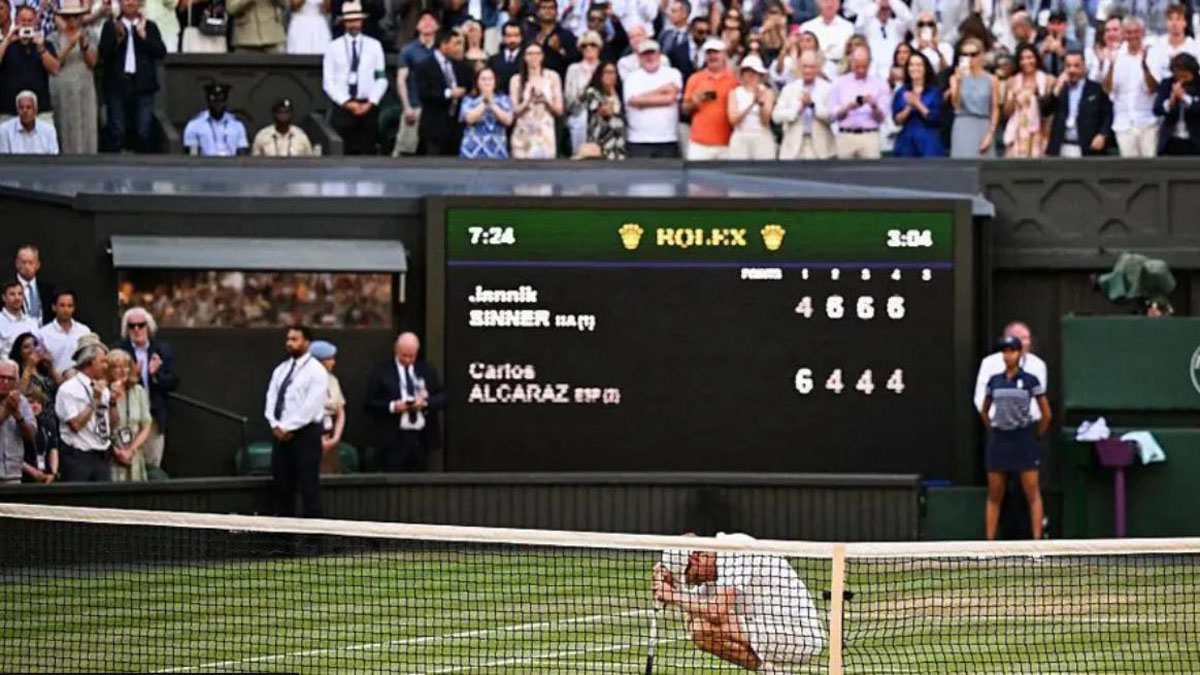The long game: Sinner, Wimbledon, and the art of hanging in

They say sport doesn’t build character. It reveals it.
This week, on the grass of Wimbledon, Jannik Sinner showed us what resilience really looks like. Against the odds, after the heartbreak of Paris and the shadow of his own mistakes, he kept the ship on course. He stared down the same rival who had broken him five weeks earlier and, point by point, wrote his redemption song, a quiet hymn of grace under pressure.
It wasn’t just a tennis match. It was a masterclass in staying the course when the wind changes, in holding your nerve when the walls close in, in keeping your head when the crowd and your own doubts roar against you.
I’ve lived long enough to know that life, like tennis, is not won in the easy moments. Anyone can play a forehand when the sun’s out and the court’s smooth. But what do you do when you’re two sets up and lose three championship points? When the clay feels like quicksand under your feet? When the world stops clapping and starts questioning?
You dig deep. You hang in there. You play the next point as if it’s the only point that matters.
Sinner came to London carrying scars visible and invisible. The French Open final had tested not just his body but his soul. He had every excuse to go quietly, to let the story become one of what might have been. But instead, he steadied the ship. He weathered the storm. He stayed in the fight.
He did what champions and good people do.
The Italian has always struck me as a man carved from the Dolomites themselves: cool, solid, unyielding. An iceman with a furnace somewhere deep inside. In Paris, the cracks showed. In London, he patched them with quiet courage and carried on.
And isn’t that what life demands of us all?
We all suffer unforced errors in our work, in our families, in our private battles. We all face long rallies where it feels like nothing we hit comes back right. We all double fault under pressure. But the ones who rise, the ones we remember, are the ones who shake it off, adjust their grip, and step back to the baseline with steely intent.
It’s not always pretty. Resilience rarely is. It’s a grind. It’s messy. It’s eating humble pie and showing up anyway.
On Sunday, Sinner stood on Centre Court as Wimbledon champion, his arms raised to the heavens before he sank to the grass in quiet reflection. No theatrics. No fists to the sky. Just a man acknowledging the long road the setbacks, the silence, the unseen sweat that had brought him there.
His coach called it “important to close this one out.” But we knew what he meant. You can’t let your demons camp too long in your head. You can’t let heartbreak become your home. You have to find a way to finish the job and write the next chapter yourself.
The redemption song of Bob Marley played in my mind as I watched him:
Emancipate yourselves from mental slavery / None but ourselves can free our minds…
Yes, the world will keep trying to knock you off balance with scandal, with noise, with defeat. But you can still hold serve. You can still play your game.
Sinner’s story this summer is not just about winning titles. It’s about what we all hope to learn sooner or later: how to carry ourselves through the storm and not let the storm carry us away.
He is proof that you can lose and still stand tall. That you can fall and still rise. That you can be written off and still write yourself back in.
I watched from here, in Tuscany, thinking how strange it is that a young man from the Dolomites could teach an old man in the Apennines something so simple, so essential:
Hang in there.
Play the next point.
Keep your eyes on the ball and your ship on course.
The sun still rises. And so can you.
Sports